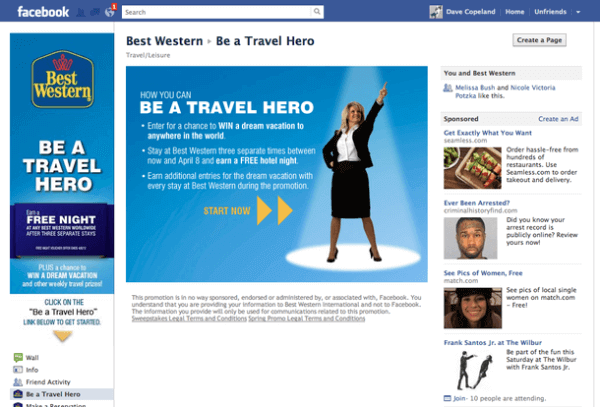Best Western became the first global hotel to allow users to book rooms through its Facebook page.

As we reported earlier this week, loads of retailers have been closing down their Facebook storefronts because they simply aren’t worth the effort. Travel is a completely different sector, and one that seemingly could lend itself to better integration with a social network like Facebook.
That is, if only Facebook could figure out travel advertising, or Best Western could figure out social media.
“We’re embarking on a new age in media,” Dorothy Dowling, Best Western’s senior vice president of marketing and sales, told USA Today. “It requires different thinking.”
But so far, the thinking isn’t all that different from frustrated retailers. Best Western has a static Facebook page that you can “like,” and as far as Facebook landing pages go, it’s smart looking (if not all that functional. Look carefully: the link to use the new reservations feature is the in the lower left hand corner of the screenshot below).

You won’t find better deals on the Facebook page than you would on Best Western’s Web site. And most importantly, the page can’t jump in with a friendly prompt when you’re doing something that may have you thinking about travel. Something like checking event invites and debating whether or not to head to you high school reunion. Wouldn’t you be more inclined to go if you knew the Best Western in your hometown was going to offer you a special deal on the room so you can see what those half-forgotten friends are like off Facebook?
The possibilities are endless once Facebook steps up efforts (or brands demand) better integration between Facebook pages and ads: once Best Western gets me to “like” its page, it can jump in and make me an offer anytime I use certain keywords: “friend’s wedding” and “business trip” and “ski vacation” come to mind, but SEO types can probably offer more suggestions. Is it intrusive? Sort of. But study after study has shown people don’t mind advertising as much when they’re being pitched something they actually need.
As we mentioned earlier today, Facebook’s current advertising growth strategy seems to be a plan that involves saturating the site with more ads in hopes of hitting the revenue targets investors will expect it to shatter once its shares start trading. That’s not good for users, that’s not good for advertisers and, most of all, that’s not good for Facebook.
Photo courtesy of ShutterStock.

















